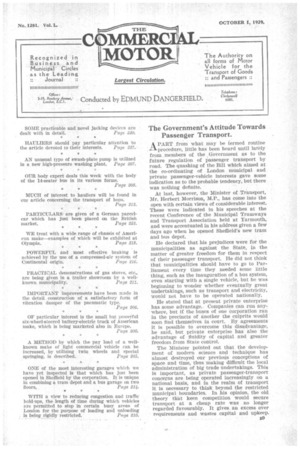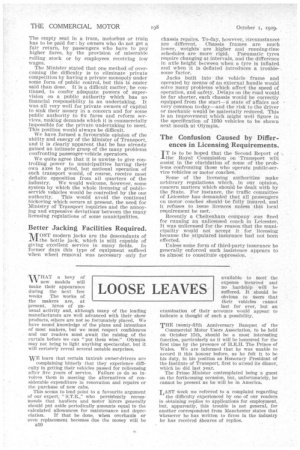The Government's Attitude Towards Passenger Transport.
Page 43

Page 44

If you've noticed an error in this article please click here to report it so we can fix it.
A PART from what may be fermed routine -01-procedure, little has been heard until lately from members of the Government as to the future _regulation of passenger transport by road. The quashing of the Bill which aimed at the co-ordinating of London municipal and private passenger-vehicle interests gave some indication as to the probable tendency, but there was nothing definite.
At last, however, the Minister of Transport, Mr. Herbert Morrison, M.P., has come into the open with certain views of considerable interest. These were indicated in his speeches at the recent Conference of the Municipal Tramways and Transport Association held at Yarmouth, and were accentuated in his address given a few days ago when he opened Sheffield's new tram and bus depot.
He declared that his prejudices were for the municipalities as against the State, in the matter of greater freedom for them in respect of their passenger transport. He did not think that municipalities should have to go to Parliament every time they needed some little thing, such as the inauguration of a bus system, even starting with a single vehicle, but he was beginning to wonder whether eventually great undertakings, such as transport and electricity, would not have to be operated nationally.
He stated that at present private enterprise has some advantage. Companies can run anywhere, but if the buses of one corporation ran in the precincts of another the culprits would soon find themselves in court. By agreements It is possible to overcome this disadvantage, he said, but private enterprise has also the advantage of fluidity of capital and greater freedom from State control.
The Minister pointed out that the development of modern science and technique has almost destroyed our previous conceptions of space and time, thus making difficult the local administration of big trade undertakings. This is important, as private passenger-transport concerns are being operated increasingly on a national basis, and in the realm Of transport it is necessary to think beyond the restricted municipal boundaries. In his opinion, the old theory that keen competition would secure transport at a cheap rate was no longer regarded favourably. It gives an excess over requirements and wastes capital and upkeep. The empty seat in a tram, motorbus or train has to be paid for : by owners who do not get a fair return, by passengers who have to pay -higher fares, by the provision of miserable
rolling stock or by employees receiving low wages.
The Minister stated that one method of overcoming the difficulty is to eliminate private competition by having a private monopoly under some form of public control, but this is easier said than done. It is a difficult matter, he continued, to confer adequate powers of supervision on a public authority which has no financial responsibility in an undertaking. It was all very well for private owners of capital to sink their money in a concern and for some public authority to fix fares and reform services, making demands which it is commercially impossible for the private undertaking to meet. This position would always be difficult.
We have formed a.favourable opinion of the ability and energy of the Minister of Transport, and it is clearly apparent that he has already gained an intimate grasp of the many problems confronting passenger-vehicle operators.
We quite agree that it is unwise to give controlling power to municipalities having their own axes to grind, but national operation of such transport would, of course, receive most definite opposition from all quarters of the industry. We wonld welcome, however, some system by which the whole licensing of publicservice vehicles would be controlled by the one authority. This would avoid the continual bickering which occurs at present, the need for Ministry of Transport inquiries and the annoying and expensive deviations between the many licensing regulations of some municipalities.
Better Jacking Facilities Required.
AirosT modern jacks are the descendants of -LV-I-the bottle jack, which is still capable of giving excellent service in many fields. In former days this type of equipment sufficed when wheel removal was necessary only for chassis repairs. To-day, however, circumstances are different. Chassis frames are much lower, weights are higher and running-time schedules are more rigid. Pneumatic tyres require changing at intervals, and the difference in axle height between when a tyre is inflated and when it is deflated introduces a troublesome factor.
Jacks built into • the vehicle frame and operated by means of an external handle would solve many problems which affect the speed of operation, and safety. Delays on the road would. be far shorter, each chassis would be correctly equipped from the start-6 state of affairs not very common to-day—and the risk to the driver or mechanic would be materially reduced. This is an improvement which might well figure in the specification of 1930 vehicles to be shown next month at Olympia.
The Confusion Caused by Differences in Licensing Requirements.
IT is to be hoped that the Second Report of the Royal Commission on Transport will assist in the elucidation of sonic of the problems confronting those who operate public-service vehicles or motor coaches.
Some of the licensing authorities make arbitrary regulations which, in our opinion, concern matters which should be dealt with by the State. For instance, the traffic committee of Leicester has demanded that all passengers on motor coaches should be fully insured, and it refuses to issue licences unless this local requirement be met.
Recently a Cheltenham company was fined for running an unlicensed coach in Leicester. It was unlicensed for the reason that the municipality would not accept it for licensing because the stipulated insurance had not been effected.
Unless some form of third-party insurance be generally enforced such insistence appears to us almost to constitute oppression.






















































































































